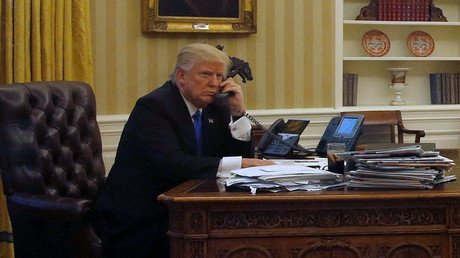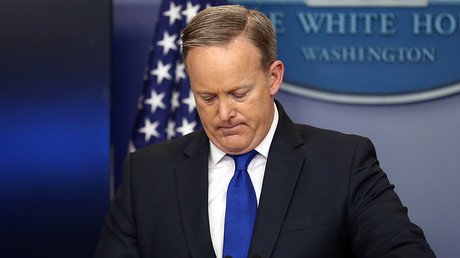Whac-a-Mole? White House probes leaks on Trump’s calls with foreign leaders
Officials in the White House are looking into leaks about President Donald Trump’s phone calls with foreign heads of state, including Russian President Vladimir Putin, calling them “very concerning.”
“We're looking into the situation, yes, and it's very concerning,” White House press secretary Sean Spicer said on Thursday as quoted by the Hill.
Spicer stressed that the way parts of the information are being revealed “is clearly a breach of a lot of protocols and laws.”
The spokesperson noted that Trump is worried by the leaks, adding that “the idea that you can’t have a conversation without that information getting out is concerning,” Spicer said.
He declined to elaborate on the nature of the investigation. Details of Trump’s phone calls with Putin and Australian Prime Minister Malcolm Turnbull have been leaked in recent days, alongside portions of the conversations with the heads of Mexico and France.
When it came to his call with Putin, Reuters reported that Trump was stumped when the Russian leader asked about extending the 2010 New START arms-reduction treaty, and that the US president had to pause to ask his aides what the agreement was actually about. He then responded by telling Putin the treaty was a series of bad deals negotiated by the previous Obama administration noting that New START includes terms which effectively were in Russia’s favor.
Trump's opponents were quick to express their discontent with the leader's apparent lack of knowledge, with Democratic member of the Senate Foreign Relations Committee Jeanne Shaheen accusing him of negligence.
“It’s impossible to overstate the negligence of the president of the United States not knowing basic facts about nuclear policy and arms control,” Shaheen said, adding that New START made the US “safer.”
Yet, Spicer rebuffed claims that Trump essentially lacked the knowledge on the agreement, but was merely asking his staff for an opinion.
“I would say they had a very productive call,” Spicer told reporters. “It wasn't like he didn’t know what was being said. He wanted an opinion on something.”
New START gives both the US and Russia until February 2018 to reduce their deployed strategic nuclear warheads to no more than 1,550 – the lowest level in decades. It also limits deployed land- and submarine-based missiles and nuclear-capable bombers.
Trump's knowledge of the treaty appears to have been fuzzy from the beginning, as the Republican leader referred to it as “START-Up” during a presidential debate last year, saying that Russia had “outsmarted” the US with the treaty.
However, it wasn't just Trump's call with Putin that raised eyebrows around the world. His conversation with Australian Prime Minister Malcolm Turnbull was also met with shock, after it was revealed by the Washington Post that Trump called a deal which outlines a plan for the US to accept 1,250 refugees from Australia “the worst deal ever.”
Trump reportedly said “I don't want these people” during the call, and accused the PM of trying to export the “next Boston bombers” to the US. He then ended the call after telling Turnbull it was the “worst call [of the day] by far.”
Trump later slammed “fake news” media, claiming it reported false information on the call, which he called “very civil” in a tweet.
Thank you to Prime Minister of Australia for telling the truth about our very civil conversation that FAKE NEWS media lied about. Very nice!
— Donald J. Trump (@realDonaldTrump) February 3, 2017
Turnbull refused to comment on reports of the conversation, noting that calls between world leaders are conducted “candidly, frankly, privately,” the Australian Broadcasting Corporation (ABC) reported.
He did state, however, that the relationship between the two countries is “very strong.”














